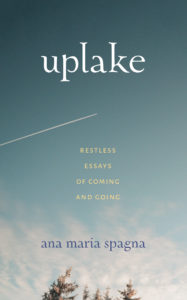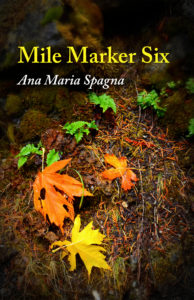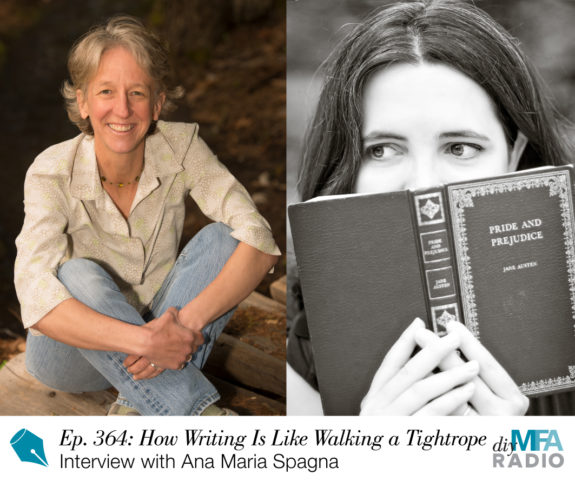Today, I have the pleasure of interviewing Ana Maria Spagna.
Ana Maria is the author of Uplake: Restless Essays of Coming and Going and several previous nonfiction books on nature, work, civil, indigenous, and LGBTQ rights. Her previous books include: Reclaimers, stories of elder women reclaiming sacred land and water, which was a finalist for the 2016 Rachel Carson Book Award from the Society of Environmental Journalists, the memoir/history Test Ride on the Sunnyland Bus: A Daughter’s Civil Rights Journey, winner of the 2010 River Teeth literary nonfiction prize, 100 Skills You’ll Need for the End of the World (as We Know It) which is a humor-infused exploration of how to live more lightly on the planet, and two essay collections, Potluck and Now Go Home.
Her first novel for young people, The Luckiest Scar on Earth, about a 14 year-old snowboarder and her activist father, released in 2017, and her first chapbook of poetry, Mile Marker Six, will appear from Finishing Line Press this fall.
Ana Maria’s work has been recognized by the Nautilus Book Awards, the Pacific Northwest Booksellers Awards, and as a four-time finalist for the Washington State Book Award. Her essays have appeared in Orion, Ecotone, Fourth Genre, Creative Nonfiction, Brevity, The Normal School, and regularly in High Country News.
After working fifteen years on backcountry trail crews for the National Park Service, she turned to teaching and is currently on the faculty of the low-residency MFA programs at Antioch University, Los Angeles and Western Colorado University.
In this episode Ana Maria and I discuss:
- How to write, assemble, and edit collections for two genres at the same time.
- The importance of non-writing work and why it is so valuable to the process.
- What writers of prose can learn from reading and writing poetry.
Plus, her #1 tip for writers.
About Ana Maria Spagna
Ana Maria Spagna is the author of Uplake: Restless Essays of Coming and Going (University of Washington Press, 2018) and several previous nonfiction books on nature, work, civil, indigenous, and LGBTQ rights, including Reclaimers, stories of elder women reclaiming sacred land and water, a finalist for the 2016 Rachel Carson Book Award from the Society of Environmental Journalists, the memoir/history Test Ride on the Sunnyland Bus: A Daughter’s Civil Rights Journey, winner of the 2010 River Teeth literary nonfiction prize, 100 Skills You’ll Need for the End of the World (as We Know It) a humor-infused exploration of how to live more lightly on the planet, and two previous essay collections, Potluck and Now Go Home. Her first novel for young people, The Luckiest Scar on Earth, about a 14 year-old snowboarder and her activist father, appeared in 2017, and her first chapbook of poetry, Mile Marker Six, will appear from Finishing Line Press in Fall 2021.
Ana Maria’s work has been recognized by the Nautilus Book Awards, the Pacific Northwest Booksellers Awards, and as a four-time finalist for the Washington State Book Award. Her essays have appeared in Orion, Ecotone, Fourth Genre, Creative Nonfiction, Brevity, The Normal School, and regularly in High Country News. Her current NF work-in-progress about Chinese miners along the Columbia River in the late 1800s has received support from Washington Trust Grants for Artists Program. After working fifteen years on backcountry trail crews for the National Park Service, she turned to teaching and is currently on the faculty of the low-residency MFA programs at Antioch University, Los Angeles and Western Colorado University.
Uplake: Restless Essays of Coming and Going

For many years, Ana Maria Spagna has stayed put, mostly, in a small mountain valley at the head of a glacier-carved lake. You’re so lucky to live there, people say. She is lucky. But she is also restless. In Uplake she takes road trips, flies to distant cities, fantasizes about other people’s lives, and then returns home again to muse on rootedness, yearning, commitment, ambition, wonder, and love. These engaging, reflective essays celebrate the richness of it all: winter floods and summer fires, the roar of a chainsaw and a fiddle in the wilderness, long hikes and open-water swims, an injured bear, a lost wedding ring, and a tree in the middle of a river. Uplake reminds us to love what we have while encouraging us to still imagine what we want.
If you decide to check out the book, we hope you’ll do so via this Amazon affiliate link, where if you choose to purchase via the link DIY MFA gets a referral fee at no cost to you. As always, thank you for supporting DIY MFA!
Mile Marker Six

From the back cover:
From Rancho Cucamonga to the Lost Coast, from the scablands to Tupshin Peak, Ana Maria Spagna’s debut poetry collection quakes with the full magnitude and magnificence of a life spent up close and personal with nature. Coyote pups “nose into rattlesnake weeds” and mud bees nest in knotholes under a “sky awash in waves of stars.” Taut lines etch an account of contemporary life in the Anthropocene, chronicling humanity’s effect on the earth, and just as importantly, the earth’s effect on us. “How rarely, now, we drop to our knees,” Spagna laments, “to protect what’s ours,” though she reminds us that “None of it is ours!” Tender in their recollections and observations, these poems teem with the poignancy, precision, and clarity of cut diamonds or, more accurately, splitting “a fir needle lengthwise to spare it harm.” Pulsing. Dazzling. Fierce.
–Jill McCabe Johnson, author of Revolutions We’d Hoped We’d Outgrown and Diary of the One Swelling Sea
“Having read some of the poems that have become Ana Maria Spagna’s At Mile Marker Six since their beginnings, I can advise the reader to follow—follow her anywhere, into the deep, over the edge, back to brass tacks, and forward into the somewhere that is a dream of the each and the every. Most crucially—and with a sacredness she invents through her clear-eyed, open-hearted looking—follow Spagna’s language to its precise and lyrical root. Such is her capaciousness that the poet invites us to introduce what is known to what is felt, and that is where love roosts, not just for us, but for every made, built, or born thing.”
–Carol Ann Davis, author of The Nail in the Tree, Atlas Hour, and Psalm
Ana Maria Spagna’s words invite the reader to embrace the intrigue of the wider world. Her poems are not pretty for pretty’s sake, nor do they distract the reader from things often considered ugly. Love, wonder, and the wild are sacred but also sometimes dirty and dead. Is it dirt or is it soil? To some, it is dirt if it is smeared on your face, but soil if we are planting in it. Spagna’s poems impress upon us this: it is always dirt and it is always soil. She takes the world and pokes at it with a trailside stick – forcing us to pay attention, to gaze, to engage with each object of her noticing.
–Mara Panich, author of Blood is Not the Water
You can pre-order a copy here.
(Right-click to download.)
If you liked this episode…
Head over to iTunes, Stitcher Radio, Spotify, or Google and subscribe so you’ll be first to know when new episodes are available.
Also, remember that sharing is caring so if you know anyone who might enjoy this podcast, please tell them about it or leave us a review so other listeners will want to check it out.
Until next week, keep writing and keep being awesome!








